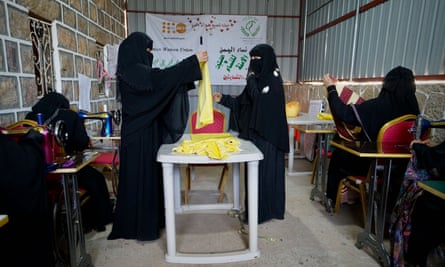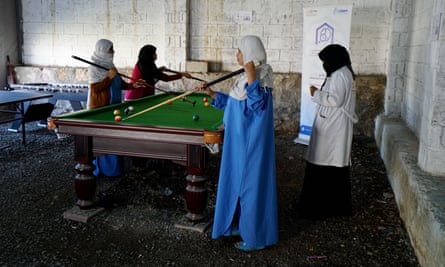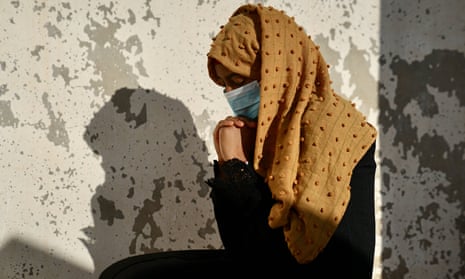Rima* was married the year civil war erupted in Yemen. She was 15 and for much of the time over the next five years, her husband kept her chained to a wall in their home in central Yemen. “He didn’t treat me as a wife, he treated me as a slave,” says the 21-year-old.
An aunt eventually took pity on Rima, taking her to a psychosocial support centre in the town of Turba, 90 miles (145km) north-west of Aden. According to a doctor there, Rima now suffers from a neurological disorder brought on by the constant beatings.
Like far too many Yemeni women, often married before the age of 18, Rima has never known safety in her own home. The six-year civil war has exacerbated already high levels of violence against women, and led to drastic cuts in funding for safe spaces such as the one in Turba, because of competing urgent needs. Some 80% of the population of Yemen requires some form of humanitarian assistance, and food insecurity is rising. At the same time, according to the UN, demand for services for women who were victims of violence rose by 36% in 2017.
“It’s a big problem. It has always existed, even before the war, so it is not something new,” says Nestor Owomuhangi, Yemen’s UN Population Fund representative. Part of the increase, he says, is probably down to better awareness of the problem, as programmes were established in areas where there had been little acknowledgment of domestic violence. Now, he says, “the crisis exacerbates the risk”.
In the conflict, armed men have taken advantage of the insecurity of those displaced by the violence; 83% of displaced people in Yemen are women and children.

Also in the clinic is 14-year-old Salwa*, who left the city of Taiz, north of Turba, with her family in 2015. One afternoon last year, a militia fighter high on drugs burst into the flat her family had rented. He tore her hair from her scalp and tried to rape her, but her screams brought neighbours running. The man was sentenced to six weeks in jail. “I want to be a lawyer when I grow up,” she says, “because I feel I didn’t have any rights, because I didn’t get justice.”
Rima also blames drugs in part for her husband’s irrational and brutal fits of rage. He was a dealer in khat, the narcotic leaf that many Yemenis chew.
As a child bride she was statistically more likely to undergo abuse. In Yemen there is no statute limiting the age of marriage and in 2017, the UN reported that 52% of Yemeni women had been married before the age of 18. Anecdotal accounts suggest those rates have soared upwards as the war has continued and families slide further into poverty, leaving children hungry.
Rima had to abandon school. “My husband didn’t want me to continue my studies,” she says. “I was a school leaver, grade 12, about to finish. He didn’t allow me to finish.”
“He told me, ‘You’re dumb and you’re not able to talk’,” she says. He disparaged the poetry she loved to write.
When she became pregnant and suffered badly with morning sickness, he got so angry that he kicked her in the stomach. She lost her child.
“Intimate partner violence is the most frequent form of gender-based violence,” Owomuhangi says. And domestic violence in Yemen is often cemented into religious and family structures.
“My family says you have to be patient, you have to put up with him,” Rima says. “My parents are very conservative. They want to take me out of the centre and keep me at home with handcuffs on. They treated me as if they had found me in the street.”
Gamil Gemayel, the manager at the Turba centre where Rima was given safe lodgings and treatment, says it relies “100%, 200%, even”, on UN funding, which has been cut back because of a lack of donor support for the UN’s Yemen programme.

Since it opened in 2016, the centre has treated 2,250 women and children. But the pressures on its services are huge and growing, Gemayel says, estimating that around 80% of women in the area have suffered some trauma as a result of the war.
“In August, after the budget cuts, we had to stop giving away some medicine free to patients who needed it,” Gemayel says.
Rima’s treatment has given her the courage to demand a better future. “I’d rather go and live in a cave in the mountains than return to my husband.
“I want to go back to studying. I want to have a future,” she says. “I want to be anything, I want to be a doctor. And I want to be a cop so I can take my husband to court.”
*names have been changed
In the UK, call the national domestic abuse helpline on 0808 2000 247, or visit Women’s Aid. In Australia, the national family violence counselling service is on 1800 737 732. In the US, the domestic violence hotline is 1-800-799-SAFE (7233). Other international helplines may be found via www.befrienders.org
